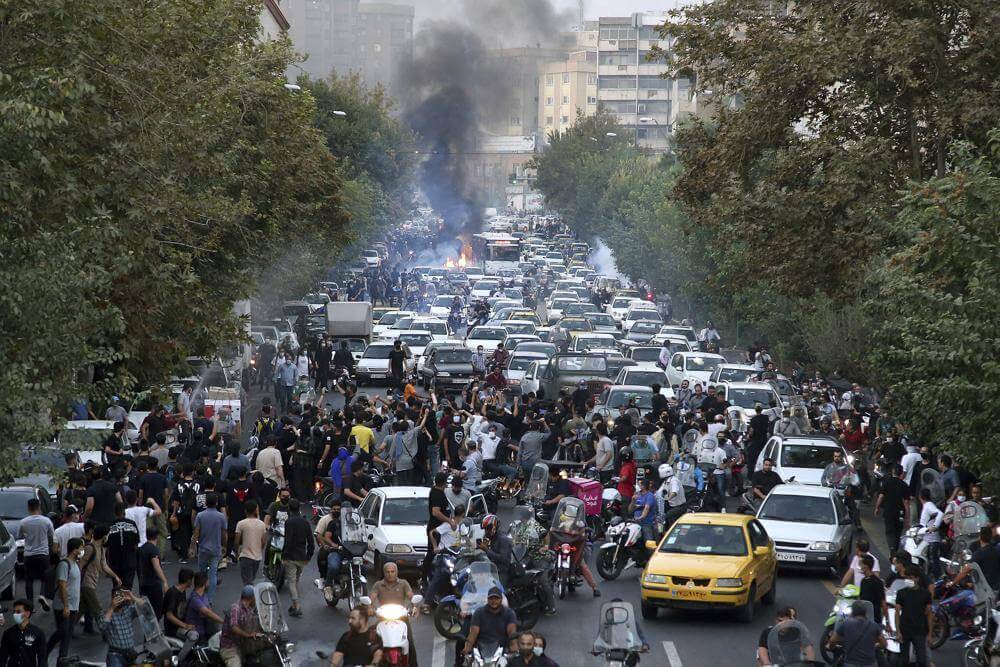At least nine people have died in Iran as mass protests demanding an end to mandatory hijab laws and their brutal enforcement by morality police spread across the country. Protesters also demanded justice for 22-year-old Mahsa Amini, whose death in police custody on Friday, a day after she was arrested for not properly covering her hair, ignited the protests.
Demonstrations continued for a fifth day on Wednesday, spreading from Tehran and Sanandaj in Iranian Kurdistan to other major cities like Orumieh, Kermanshah, Amol, Zahedan, Semnan, Marand, Eslam Shehr, Tabriz, Qom, Mashhad, Arbadil, and Sirjan. Protests also took place in smaller and remote towns, including Qeshm Island in the Strait of Hormuz and Noshehr, a Caspian Sea town.
Young people and women primarily led the protests and took unprecedented steps like removing and burning their hijabs, a move that could get them expelled from their universities. Videos of demonstrations in Tehran showed several women cutting their hair in solidarity with Amini. Thousands of protesters chanted slogans like “death to the dictator,” referring to Supreme Leader Ayatollah Khamenei and “justice, liberty, and no to mandatory hijab.”
in Sari in northern Iran, a woman dances and throws her headscarf in fire amid cheers and chants of "We're all in this together." #Mahsa_Amini #مهسا_امینیhttps://t.co/ExyUZkEJem
— Golnaz Esfandiari (@GEsfandiari) September 20, 2022
Several demonstrators expressed hope that the protests would end the mandatory enforcement of the hijab. “While we were waving our headscarves in the sky, I felt so emotional to be surrounded and protected by other men. It feels great to see this unity. I hope the world supports us,” a protester said.
Protesters also clashed with security forces, who launched a brutal crackdown to suppress the protests. According to reports, the police fired live rounds at protesters and fired tear gas. Six protesters were reportedly shot dead by the police. Security forces claimed that protesters killed two police officers. Moreover, a member of the Basij paramilitary force was stabbed to death by protesters in Mashhad.
⚠️ #Iran is now subject to the most severe internet restrictions since the November 2019 massacre.
— NetBlocks (@netblocks) September 21, 2022
▶️ Mobile networks largely shut down (MCI, Rightel, Irancell - partial)
▶️ Regional disruptions observed during protests
▶️ Instagram, WhatsApp restrictedhttps://t.co/8cCHIJA2Oi
NetBlocks, an internet watchdog, reported that the regime has imposed the most severe internet restrictions since the November 2019 protests. This week, authorities put in place a “near-total disruption to internet services” in many parts of Kurdistan, where the latest iteration of protests began.
“Instagram and WhatsApp, two of the last remaining international platforms in Iran, have subsequently been restricted nationally as of Wednesday,” NetBlocks noted, adding that the government has also shut down telecom services across the country.
“The network disruptions are likely to severely limit the public’s ability to express political discontent and communicate freely,” the organisation emphasised. It asserted that this class of internet disruption “affects connectivity at the network layer and cannot generally be worked around with the use of circumvention software or VPNs.”
Iranians are so frustrated, their anger is exploding in the streets. The international community needs to support them in determining their own future. pic.twitter.com/cjYOU4HTcG
— Masih Alinejad 🏳️ (@AlinejadMasih) September 21, 2022
Iranian officials claim that the protests have been organised by Kurdish militant groups. Tehran Governor Mohsen Mansouri, for instance, said they are an attempt by critics of the regime to “create unrest.” State media accused Kurdish separatists and other miscreants of using Amini’s death to undermine the government.
Amini, an ethnic Kurd, was arrested on Thursday by members of the so-called ‘Guidance Patrol,’ a police division in charge of enforcing mandatory veiling, for not wearing her hijab properly. According to reports, Amini was brutally tortured and beaten and passed away while being treated at an intensive care unit of the Kiara hospital in Tehran.
While President Ebrahim Raisi has ordered a special investigation into the incident, police have continued to deny charges of mistreatment and abuse.
Elderly woman in Iran takes off headscarf, joins the youth protests, chanting “death to Khamenei”. One of few in streets who knew how life was in Iran before the Islamic revolution 1979: pic.twitter.com/hz5BJ2j50E
— Joyce Karam (@Joyce_Karam) September 22, 2022
The international community condemned the killing of Amini and demanded that Iran end its mandatory hijab laws. The United Nations rights office released a statement expressing “deep concern” at security forces’ violent response to the protests. The release stressed that compulsory veiling rules should not exist and that women should not be punished for what they wear. “Women who defy these compulsory veiling rules should not be harassed, should not be subjected to violence and there needs to be a fair investigation,” it asserted.
The United States and the European Union also hailed the protests in Iran and called on Tehran to conduct a fair investigation into Amini’s death. US President Joe Biden expressed support for the protests during his speech at the 77th session of the UN General Assembly in New York on Wednesday. “Today we stand with the brave citizens and women in Iran who right now are demonstrating to secure their basic rights,” Biden proclaimed.
The mass protest started in Iran after the murder of Mahsa Amini. 22 y.o. Mahsa was arrested by the "morality police" for wearing the "wrong hijab". She was beaten to death with sticks.
— Oleksandra Matviichuk (@avalaina) September 21, 2022
The main slogan is "death to the dictator", as well as "we will take back a free Iran”. pic.twitter.com/DuR9XePgvs
Human rights groups like Amnesty International and Human Rights Watch also condemned the Iranian regime for killing Amini and demanded an end to its crackdown on protests.
Since the 1979 Islamic Revolution, Iran has enacted mandatory hijab laws, which activists say are discriminatory against women. The government has relied on Islamic law, including the Quran, to justify such laws.

